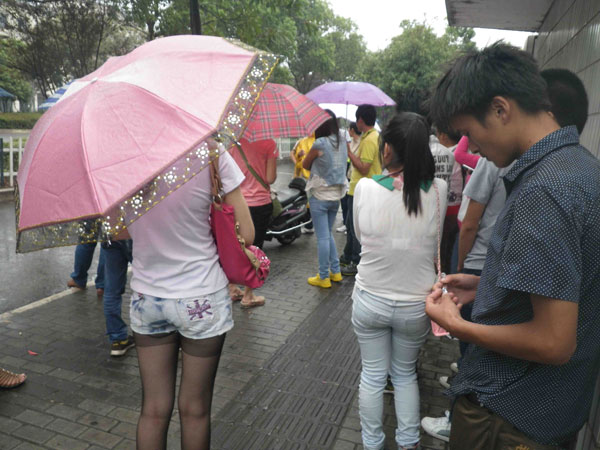[Editor's note: Every day this week we're featuring reports from Christopher Pollon's quest to follow a pound of B.C. copper from cradle to grave -- and back again. Today's story shows how B.C. metal is baked into consumer gadgets in China. To get a sense of the scope of the project, see this interactive map and introductory story.]
KUNSHAN, CHINA -- The kid standing outside the barbed wire fence at Unimicron's electronics factory near Shanghai is feeling anxious. "Is the work hard?" he asks a middle-aged man, a private recruiter who brought the youth here.
The man tells him to relax. "It'll be easy. Don't worry."
It's a Wednesday morning in September, and I'm standing with a crowd of recent high-school grads gathered to submit resumes at Unimicron, one of the world's biggest electronics manufacturing companies, and a destination for copper mined 9,000 kilometres away near Princeton, B.C.
These kids are gathered here hoping to land an entry level factory job. High-school grads with no formal training are being offered up to CDN$680 (4000 Renminbi) per month to start, with medical insurance, room and board included (no tattoos allowed, see the translated job ad they are responding to here.) It's a package that would have been unthinkably rich even five years ago, when Shanghai was booming as a low-cost workshop to the world, drawing millions of migrant labourers from across rural China.
But China's electronics production is being drawn westward, away from Shanghai, by a combination of government stimulus, power and water scarcity, and the triple temptation of lower taxes, smaller wages and weaker environmental standards. It's just the latest shift in an ongoing race to the bottom -- defined as "lowest cost." In the space of a single lifetime, electronics manufacturing dominance has shifted from the United States to Japan, to Hong Kong, Taiwan, and in the new century, to China's Yangtze delta with greater Shanghai at its heart.
"A place like Chengdu in Sichuan province (see map, below) is currently where Shanghai was 10 years ago," says B.C.-born author and Shanghai-based business analyst Jason Inch. While the economy of the Yangtze delta region is growing at a steady clip of about eight per cent a year, Inch says, former hinterlands like Chongqing and Yunnan are booming on 12 per cent a year growth.
Capital is on the move again, and with it the flow of copper that enables the existence of the electronic gadgetry most North Americans cannot live without.
BC copper in a modern smartphone
So far, I have followed British Columbia copper from its geological cradle at a mine near Princeton partly owned by Japan's Mitsubishi Materials Corporation; through the Port of Vancouver, where it's put on ships; to a Mitsubishi smelter on a Japanese island, where it is refined, and other facilities that mould and alloy the pure metal into specialty forms.
One of those is what are called "anode copper balls" -- small spheres of fine-grained, extremely pure copper often mixed with minute quantities of phosphorous. Electronics makers dissolve these in an acid solution, and electroplate the suspended metal to rigid insulating backing material to make printed circuit boards.
One of MMC's customers for this product is Taiwan-based Unimicron, one of the world's largest manufacturers of the circuit boards found in smartphones, and an Apple supplier (See Apple's full 2013 supplier list here.) Two of the company's plants are in Kunshan). Mitsubishi also sells its specialty copper balls to circuit board printers Meiko and Ibiden of Japan, both of which also supply Apple.
Taiwan a mainland force
Kunshan is like China's Silicon Valley, but in this case dominated by companies based in Taiwan. Among them: Hon Hai Precision Industry Company Ltd., better known to the world as Foxconn, the company that assembles Apple products like the iPhone using printed circuit boards containing copper mined in British Columbia.
Located about 50 km outside of Shanghai, Kunshan is a manufacturing hub for the electronics industry. In the space of 10 years, its population exploded from 135,000 to 1.34 million. By 2009, Kunshan was producing nearly half of all the laptops in the world.
Related document:
By 2011, Taiwanese companies were producing 40 per cent of the entire planet's printed circuit boards on the Chinese mainland, most in eastern coastal regions. Evidence of this huge financial presence is everywhere in downtown Kunshan: large numbers of restaurants and informal cafeterias cater to Taiwanese tastes in food.
But when I wonder aloud if there is a Taiwanese enclave here, I get a somewhat snarky reply from Xy Gu, my Shanghai-born translator: "There is none because they are Chinese." Which is true, in a sense, if not quite how many Taiwanese would paint their precarious double life in a developed democratic state backed by the U.S. militarily, but claimed as national territory by Beijing.
Sun goes fishing in Kunshan
My requests for formal tours of the Unimicron and Foxconn plants in Kunshan had been rejected outright by their respective head offices -- victims, perhaps, of a public relations scandal that, by bad luck, happened to be brewing at the time I was there.
Five environmental groups had alleged that both Foxconn's and Unimicron's factories in Kunshan were dumping heavy metals (including copper) into local rivers.
News of the possible pollution wasn't stopping a man named Sun from fishing in the Lou Jiang River, which flows from Suzhou through the centre of Kunshan on its way to the East China Sea. I met him dangling his line into its murky water from a bridge in downtown Kunshan. He's from Chongqing in central China -- by coincidence one of the areas currently attracting electronics manufacturers away from greater Shanghai -- but has a steady job in Kunshan working for a clothing wholesaler.
Sun fishes for fun, telling my translator that he cooks the fish in the spicy Sichuan style, to disguise off flavours he attributes to the river's "muddiness."
I ask if the starting wage at Unimicron is good money. He laughs. There are lots of factory jobs near his home in Chongqing. The pay is less, but the cost of living is even lower. It costs half as much for transportation, clothes and entertainment as in Kunshan, he tells me; the disparity is ever greater if you compare Chongqing with Shanghai.
Sun hooks a tiny white fish -- it's a Carassius cuvieri, an invasive carp native to Japan -- and drops it into a box fluttering with the day's catch. "If I wanted a factory job I would have just stayed home." ![]()
Read more: Labour + Industry, Environment

















Tyee Commenting Guidelines
Comments that violate guidelines risk being deleted, and violations may result in a temporary or permanent user ban. Maintain the spirit of good conversation to stay in the discussion.
*Please note The Tyee is not a forum for spreading misinformation about COVID-19, denying its existence or minimizing its risk to public health.
Do:
Do not: